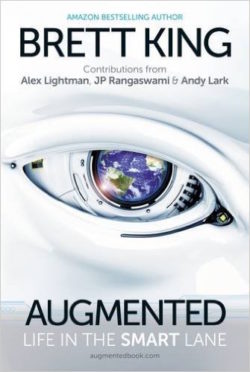
When we think of global corporations and business in general, do we feel pride in how we do things? Beyond Good, a new book by Unconventional Ventures co-founders Theodora Lau and Bradley Leimer, is a call to arms for business leaders to recognize how they can do well by doing good.
Beyond Good showcases how fintech is changing business models and what every industry can learn from it. The leaders in financial services are fostering a thriving ecosystem of incumbents and startups, unlocking new possibilities to make broader financial inclusion a reality.
With a foreword from the Aspen Institute, exclusive interviews with leading B-Corps, policy makers, executives, and case studies from companies like Sunrise Banks, Ant Group, Village Capital, Microsoft, and PayPal, Beyond Good shows how everyone can contribute to a more common good. Finovate readers can also get 20% off their copy of the book, using code Inspire20.
Below are a few excerpts from our conversation with Theo and Brad on the new book and their upcoming appearance at FinovateSpring next month. For the full interview, check out the video above.
On the importance of financial inclusion
Theo Lau: “If we talk about the onset of the so-called fintech revolution, if you will, a lot of the new startups seemed to regurgitate old ideas that have already been around. They make it prettier, they create this bamboo credit card … But it that really changing our behavior, is it really changing how we work? In the West, are we really including more demographics and doing things better for them? I would argue a lot of the time we are not.”
Bradley Leimer: “Inclusivity goes much broader than just a credit card or just lending or just credit. And that’s a lot of what we discuss. There’s more to a financial relationship than one side of the balance sheet. There’s more to the financial services model than just profitability. There are longer term implications in everything we do every single day and every decision that we make.”

Why fintechs and financial services need to move “beyond good.”
Leimer: “We’ve seen a lot of stakeholder capitalism lately and examples of companies that have tried to mean more for their business model and their communities. That’s what we celebrate in the book, the shift that we can include more people in our communities in society. Especially in financial services and technology, companies we really need to focus how we can serve these larger groups. Everybody in society should be able to be a part of our business models. And that’s why we go “beyond good.”
Lau: “We want to reinforce that this is not a zero-sum game. Just because we are including more demographics and more considerations on how we conduct business doesn’t mean you’re losing. Case in point, one of the things lately we’ve been talking about is student loan debt, $1.7 trillion dollars of debt. Obviously the burden is shared across all demographics, but particularly in communities of color, among first generation college students, and among those in other less advantaged groups.
So our question is: how do we go about solving it? There are a lot of different moving parts. But for financial services, the role isn’t just to offer another loan on top of the pile of deb because that’s not solving the problem. We need to go back further to ask how we create a more equal society, more equal products, and create services to help people rethink their finances and get to a healthier financial situation.”
Join Theo Lau and Bradley Leimer at FinovateSpring May 10 through 13. For more information about our upcoming, all digital, spring fintech conference, visit our FinovateSpring hub today.
Photo by Steve Johnson from Pexels


 So what are 21st century technological revolutions made of? King sees four key disruptors that will define the way we will live in the decades to come: artificial intelligence, smart infrastructure, healthcare technology, and what he calls embedded and distributed experiences. This last category includes the sort of virtual technologies that companies like Facebook have made major investments in, as well as the “Internet of Things” concept that King describes as a world in which “everything is able to give feedback.”
So what are 21st century technological revolutions made of? King sees four key disruptors that will define the way we will live in the decades to come: artificial intelligence, smart infrastructure, healthcare technology, and what he calls embedded and distributed experiences. This last category includes the sort of virtual technologies that companies like Facebook have made major investments in, as well as the “Internet of Things” concept that King describes as a world in which “everything is able to give feedback.”